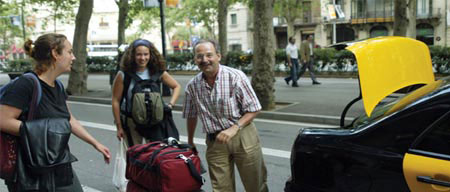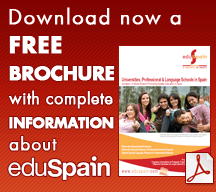Home > Study in Spain > Travel In Spain
Travel In Spain
Check that your passport is valid for at least 6 months after your departure date. Your passport must be valid for at least this period of time, and in some countries it must be valid for at least a year in order to obtain a visa.
Electricity
In Spain the voltage is 220 volts and 50 hertz. If you bring electronic items with you, and you come from a country where the voltage is less, for example the United States where it is 110, you will need a voltage transformer or adaptor plug.
Weather
Normally the weather in Spain is not very cold compared to many other countries although it varies from region to region. Search the weather for the city that you will be in on the internet.
Security
In Spanish cities, as in other major cities in the world, certain precautions should be taken. We advise the following:
Keep an eye on your luggage constantly in airports and bus and train stations.
Keep an eye on your bag in bars, restaurants and other public places and take care in the street, particularly if you are wearing a backpack.
Leave your documents in a safe place, such as your apartment or residence, but always have a document that confirms your identity with you.
In case of theft, contact the police immediately.
Always carry the 24 hour eduSpain number in case of an emergency.
Useful telephone numbers
- 091 Police
- 112 Emergencies (Ambulance, Fire Brigade, Police, Guardia Civil)
- 1008 Reverse charge calls to Europe, Algeria, Libya, Morocco, Tunisia and Turkey
- 1006 Reverse charge calls to the rest of the world
- 1025 International information
Public Transport
Spain has a very good public transport system and in the majority of cases it is the fastest, most practical and most economic way of getting around. The Spanish railway network is one of the best in Europe.
If you intend to travel by train and need information about timetables and destinations visit www.renfe.es.
For information about bus timetables you can consult the respective webpage for each bus company.
Opening hours
The majority of shops are open from 09:00 or 10:00 until 13:30 or 14:00 and then from 17:00 until 20:00 or 20:30. The large stores are open from 10:00 until 22:00. Shops are normally closed on Sundays.
Embassies, ministries and other official organizations are usually only open in the mornings.
Tips/IVA
Leaving a tip in Spain is not as strict as in other countries. In fact, in some cities it is quite normal to not leave a tip in bars or taxis. In restaurants a tip of 5-10% is more than sufficient.
IVA is the E.U tax. In restaurants and hotels the IVA is 7%, regardless of their category.
Changing Money
The official currency in Spain is the euro. You can change money in any bank. The majority of these are open from 08:30 or 09:00 until 14:00 or 14:30.
There are also money exchange booths in airports, tourist centers, train stations and 4* or 5* hotels. However, they will charge you a higher commission rate so it is better to change money in the bank.
In Spain there are a large number of cash-points (ATMs) that accept credit cards which you can also use in many establishments (bars, restaurants etc). Traveler's checks can be changed in any bank. To do this you will need to show an official document of identification or a passport.
Social Customs
As the saying goes… "When in Rome, do as the Romans do". Probably many of the Spanish customs will be different to those in your own country.
One of the first things that may strike you when you arrive in Spain is the Spanish meal times. Breakfast consists generally of milk, coffee or juice and toast or a sweet roll. Lunch is the largest meal of the day and is usually taken between 1.30pm and 3.30pm. It consists of two dishes and a dessert. Dinner is lighter and tends to be between 8.30pm and 10.30pm. The majority of people do not go to bed until after 11.30pm.
There will of course be other small details that stand out but try to appreciate the customs that are different from yours. Make the most of the opportunity of living in a new country to acquire a better knowledge, not only of the language but also of the culture and traditions of the people.

